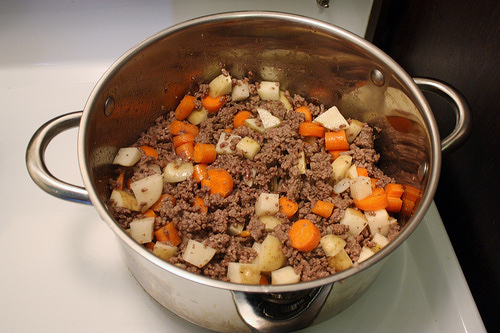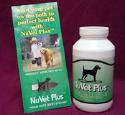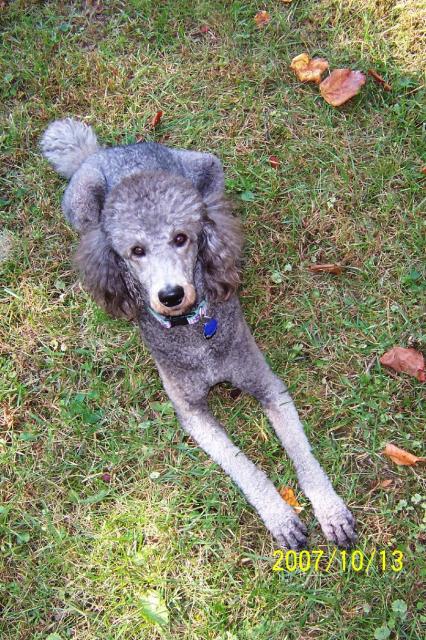QuestionHi, I have a 12yr. old 8lbs. spayed female yorkie("Cricket"). She has recently been dx. with Diabetes. My Vet and I are working together to regulate her blood sugar. While doing research on her diabetes, I also found out just how bad the food I have been feeding her is. I have fed all my dogs Nutro Max - maximum weight control. I want to switch them to a Holistic Food (human grade only) that I can supplement with an occasional home cooked meal once or twice a week. I want to know what holistic food you suggest for Cricket and how much to feed her. I need some good diabetic recipes that have portion sizes for a dog her size. All the recipes I find do not give enough instruction on portion size for individual dogs. I also have 3 other dogs "Kutter" Aussie-13yrs (40lbs.), "Slick" Yorkie-12yrs (8lbs.), "Higgins" Yorkie/Pom mix (5lbs.)
I have recently started all of them on Nuvet plus. I have been thinking of EVO small bite??? What do you think of it? Also I would like to know how you feel about a high protein diet for a senior dog? Is it true; new research shows older dogs need as much or more protein as younger ones? Should I monitor their Urine protein levels bi-yearly? (not sure what the name of the test is? but I know I should check the urine as well as the blood because it will show up there first.) Also I know a "Full Spectrum Cinnamon can help Cricket regulate her blood sugar as a supplement to her vetsulin inj. (she gets 3 1/2 unts 2xdaily) I cannot find anyone who can tell me how much of it to give her. I have it in a 375mg capsule. I know I should know how much to feed but I have always fed free choice and it has always worked for me. They all eat what they want, when they want it, from the same bowl and no one is overweight or underweight. If you could give me some guidance in these matters I would be most grateful.
AnswerHi Vicki,
Well, you definitely have a lot going on here. I will try to chunk this series of questions down and answer them individually, and if anything is unclear or requires more input, I'd be happy to expand on it.
You wrote:
"Hi, I have a 12yr. old 8lbs. spayed female yorkie("Cricket"). She has recently been dx. with Diabetes. My Vet and I are working together to regulate her blood sugar. While doing research on her diabetes, I also found out just how bad the food I have been feeding her is. I have fed all my dogs Nutro Max - maximum weight control. I want to switch them to a Holistic Food (human grade only) that I can supplement with an occasional home cooked meal once or twice a week. I want to know what holistic food you suggest for Cricket and how much to feed her."
Diabetes is one condition that requires strict regularity of feeding, and while the quality of the food is always a factor, there are other issues to consider when feeding a diabetic dog. There is also some controversy - I can tell you what the textbooks say, but also that in real life practise I have seen many cases where the suggested diets were not optimal and in fact, a very different nutrient composition (eg, high protein) worked well.. My bottom line is to take each case as an individual and evaluate the dog's history, including any other health problems, and how she is doing on the nutrient composition of the current food (by this I mean fat/fiber/protein content, not ingredient quality, although the latter does bear on the former, with diabetes the first thing you have to get right is the energy nutrient composition, and then look at the foods that will supply those nutrients.)
The bottom line here is it's very difficult to suggest *the* food that will work for your dog - I prefer to see diabetics on a home made protocol, but I fully understand this isn't always possible.
A few key factors to consider are:
1) consistency of feeding; you need to keep your dog on the same food, and feed at the same time. This means the same foods, and the same proportion of fat, carb and protein
2) Keep a moderate fiber level in the diet and at least 40% of the energy (ME basis) from complex carb...fiber tneds to slow digestion and help keep glucose levels stable
3) Choose foods with a lower glycemic response (link below)
3) Moderate fat restriction - pancreatitis is a common complication with diabetes so keepg fat lower, ubt not as restricted as with pancreatitis, is a good idea
4) Keep weight under control
This is the textbook approach, but I have seen dogs with Type I diabetes do very well on higher protein. I don't like using white potato for senior dogs, so that makes many of the protein focused foods a problem. Ultimately I would start the dog with one of the premium foods, and monitor how she does. No matter what the condition all dogs require good, balanced nutrition - you might look at
http://www.solidgoldhealth.com/products/showproduct.php? as a starting point, orid=68&code=140
If your dog likes fish, this has a nice nutrient profile for your dog - I don't like a lot of rice for diabetics, but there's an assortment of fiber which will help keep glucose levels stable:
http://www.frommfamily.com/products-fs-d-d-salmon.php
But again, without a working relationship here I can only make suggestions. A few tools for you that might help:
http://www.vmth.ucdavis.edu/home/NUT/brochures/diabetes.doc?html
veterinary article on diabetes
http://www.becomehealthynow.com/article/carbs/8/
Some info on the glycemic index of foods
http://www.nutritiondata.com/
ALL KINDS of nutrition information, including glycemic indeces
This is going to be too long, so I hope that helps and I will get to your other questions now.
you asked:
"I need some good diabetic recipes that have portion sizes for a dog her size. All the recipes I find do not give enough instruction on portion size for individual dogs. I also have 3 other dogs "Kutter" Aussie-13yrs (40lbs.), "Slick" Yorkie-12yrs (8lbs.), "Higgins" Yorkie/Pom mix (5lbs.)
"
As a professional I would feel uncomfortable providing a generic recipe for a dog with diabetes. This would require a consultation and a lot more information than I have. If you wish to discuss a consult, contact me at catlane@thepossiblecanine.com - check my website www.thepossiblecanine.com for information on my training, experience and services. It's just not a good idea to use a diet that has not been developed specifically for the dog, it *might* work, but it might not, and those aren't chances I'm willing to take.
You asked:
"have recently started all of them on Nuvet plus. I have been thinking of EVO small bite??? What do you think of it? "
I am not a fan of formulas like NUVet that contain a little bit of everything and not really a whole lot of ANYthing. There are so many ingredients and very little of each, a dog can easily react to one or more, while deriving very little good from the extremely low amounts of each. I develop individualized supplement protocols for dogs that usually involve using human grade, individual herbs or supplements - in the correct amount needed for therapeutic benefit. As for EVO, it's not my favourite of the protein focused foods. If I were to recommend one, it would be Wellness CORE reduced fat formula. But again, I would start your diabetic dog on a more conservative program with higher fiber. There are some good things about EVO and some detractions, it's a matter of matching the food with the individual dog. :)
You asked:
"Also I would like to know how you feel about a high protein diet for a senior dog? Is it true; new research shows older dogs need as much or more protein as younger ones? Should I monitor their Urine protein levels bi-yearly? (not sure what the name of the test is? but I know I should check the urine as well as the blood because it will show up there "
A higher protein diet for seniors has been shown to help reduce muscle loss, which makes sense of course, since the body will start using it's own tissue if adequate protein is not provided dietarily. One reason protein *used* to be restricted was the link to kidney disease; current reserach suggests it's more likely to be related to the phosphorus content than the actual protein. One factor to consider is the quality of the protein; older dogs may not be able to metabolize as efficiently as younger ones, and so the more fresh and bioavailable a protein source is, the less you need to feed of it. I run a geriatric screening on my senior dogs twice a year, both liver and kidney function are evaluated. If I see early stage renal issues, I reduce phosphorus. I could write a small book on this, but suffice it to say, no, you should not reduce protein for your senior, and you may actually want to increase it, depending on the individual dog. You may also want to lower the total energy consumed,(calories) and total dietary fat. My ideal senior dog diet is lower in energy and fat, higher on protein, contains no nightshades at all, and uses fish oil for a good portion of the total fat(Omega3 fatty acids). Other supplements, such as CoEnzymeQ10 and glucosmaine, can be very helpful as well.
A good allround site for the senior dog caregiver:
http://www.srdogs.com/Pages/care.fr.html
You asked:
"Also I know a "Full Spectrum Cinnamon can help Cricket regulate her blood sugar as a supplement to her vetsulin inj. (she gets 3 1/2 unts 2xdaily) I cannot find anyone who can tell me how much of it to give her. I have it in a 375mg capsule. I know I should know how much to feed but I have always fed free choice and it has always worked for me. They all eat what they want, when they want it, from the same bowl and no one is overweight or underweight. If you could give me some guidance in these matters I would be most grateful."
I would advise you not to continue free feeding now your one dog is diabetic. As mentioned above, you need to keep her on a strict feeding schedule. I know of a very highly regarded yahoogroup where I am sure you'll get a lot of support and reliable information, but I can't bring the name to mind yet. If you want the link email me and I will find it for you - for general nutritional guidance, you can join me at http://groups.yahoo.com/group/ThePossibleCanine-Nutrition
I don't know the dosage you need to give, but I would discuss that one with your vet.
Hope this helps a little and sorry for the late reply - I knew it was going to take a while and I usually try to take the weekends off. <g> Hope it helps, feel free to ask if anything is unclear. And sorry I can't just send a recipe, that's not the way I work, nor is it in your own dog's best interest.
All the best!
Catherine

 Switching Diets & Cooking for my Dog
QuestionHello!
I have an 8 year old Lab/Shepherd mix a
Switching Diets & Cooking for my Dog
QuestionHello!
I have an 8 year old Lab/Shepherd mix a
 Hot dog
QuestionI am trying to determine the best nutritional b
Hot dog
QuestionI am trying to determine the best nutritional b
 Diet/Nutrition
QuestionKaiya
QUESTION: I have just become a own
Diet/Nutrition
QuestionKaiya
QUESTION: I have just become a own
 my standard poodles diet
Question
sophia
i have been cooking for my 3 year old s
my standard poodles diet
Question
sophia
i have been cooking for my 3 year old s
 Low Protein Diet for my dog
Question
Lucky
My male Chihuahua is only 10 months old
Low Protein Diet for my dog
Question
Lucky
My male Chihuahua is only 10 months old